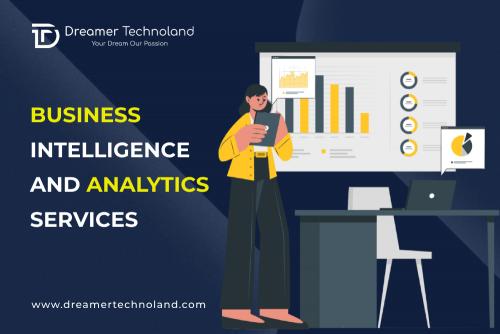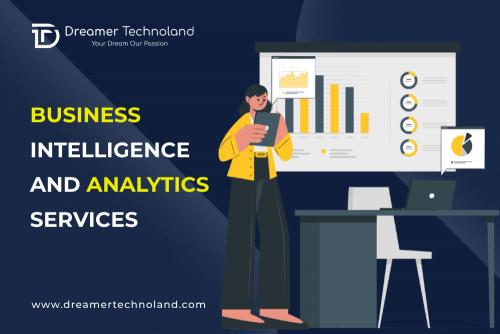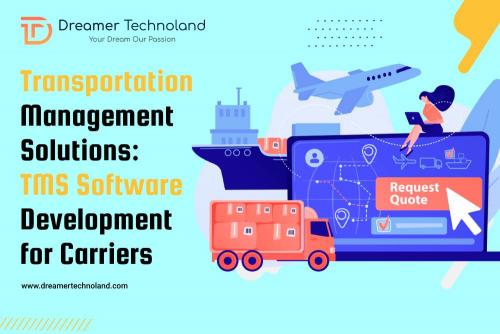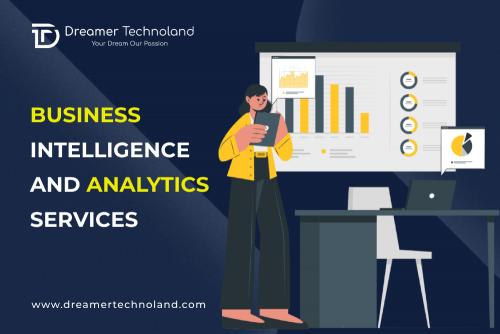Business Intelligence Vs Business Analytics: Which Platform is Right for Your Organization

Business intelligence (BI) and business analytics (BA) are two powerful tools that leverage data to improve decision-making within an organization. However, they have some key distinctions that influence which platform is best suited for your specific needs. In this blog, we will walk you through the merits and demerits of business intelligence vs business analytics and give more clarity on which one you should choose for your benefit.
What is Business Intelligence (BI)?
- Focus: BI primarily focuses on descriptive analytics, providing historical data and current performance metrics. It answers the question: "What has happened?" and "What is happening now?"
- Target Users: Enterprise Business Intelligence caters to a broader audience within an organization, from executives and managers to analysts and business users.
Benefits of Business Intelligence (BI)
- Improved Visibility: Provides a centralized view of organizational performance across different departments and functions.
- Informed Decision-Making: Empowers users with data-driven insights for making informed decisions based on past trends and current performance.
- Performance Monitoring: Facilitates continuous monitoring of key performance indicators (KPIs) to track progress towards goals.
- Typical Tools: Dashboards, reporting tools, data visualization tools.
What is Business Analytics (BA)?
- Focus: Business analytics consulting services delves deeper into data using predictive analytics and prescriptive analytics. It answers the question: "Why is this happening?" "What is likely to happen in the future?" and "What is the best course of action?"
- Target Users: BA is typically geared towards data analysts, data scientists, and business users with a strong analytical background.
Benefits of Business Analytics (BA)
- Advanced Insights: Uncovers hidden patterns, trends, and correlations within the data to provide deeper insights.
- Predictive Modeling: Enables forecasting future trends and customer behavior to make proactive decisions.
- Optimization: Helps identify areas for improvement and optimize processes for better performance.
- Typical Tools: Data mining tools, statistical analysis tools, machine learning algorithms.
Choosing the Right Platform
- Focus on Reporting and Visibility: If your primary need is to gain a clear understanding of past performance and current trends through reports and dashboards, then business intelligence consulting services provider is a great choice.
- Data Expertise: Consider the level of data expertise within your organization. BI is generally easier to use for business users, while BA often requires a stronger analytical background.
- Need for Predictive Insights: If you require advanced analytics to predict future outcomes, optimize processes, and make data-driven recommendations, then business analytics consulting services is a better fit.
Convergence and Overlap
It's important to note that business intelligence vs business analytics are not mutually exclusive. Many BI platforms incorporate basic analytical functionalities, and some advanced BI solutions can handle predictive modeling tasks. In essence, BI serves as the foundation, providing the historical data and context for further analysis with BA tools.
Why Choose Business Intelligence Services & Solutions Development?
Improved Decision-Making
- Data-driven Approach: BI replaces guesswork with data-backed insights, empowering you to make informed decisions across all levels of the organization.
- Strategic Planning: Business intelligence consulting services helps identify trends, anticipate future market conditions, and make strategic data-driven choices for long-term success.
- Problem-solving: By analyzing historical data and current performance metrics, BI facilitates effective problem identification and solution development.
Enhanced Operational Efficiency
- Process Optimization: BI helps pinpoint inefficiencies and bottlenecks within your processes, allowing for optimization and streamlined workflows.
- Resource Allocation: Business intelligence consultant empowers you to allocate resources more effectively based on data-driven insights into resource utilization and departmental needs.
- Performance Monitoring: BI provides real-time or near real-time insights into key performance indicators (KPIs) for continuous performance monitoring and improvement.
Increased Revenue and Profitability
- Sales & Marketing Insights: BI helps identify customer preferences, buying trends, and marketing campaign effectiveness, leading to improved sales and marketing strategies.
- Cost Reduction: By identifying areas of waste and inefficiency, business intelligence consulting services provider can help reduce operational costs and optimize spending.
- Upselling and Cross-selling: BI can reveal customer purchase patterns, enabling targeted upselling and cross-selling opportunities for increased revenue.
Competitive Advantage
- Market Analysis: BI empowers you to analyze market trends, identify customer needs faster than competitors, and adapt your strategies accordingly.
- Innovation: Data-driven insights from enterprise business intelligence can fuel product and service innovation, keeping you ahead of the curve in your competitive landscape.
- Risk Management: Proactive identification of potential risks through data analysis can help mitigate risks and ensure business continuity.
Overall Business Transformation
- Data-driven Culture: BI fosters a data-driven culture within your organization, where decisions are based on facts and insights rather than intuition.
- Improved Transparency: Business intelligence consulting companies promote transparency by providing a unified view of organizational performance across departments.
- Increased Collaboration: BI facilitates collaboration by providing a common data platform for various teams to work with, leading to better decision alignment.
By implementing BI services and solutions, you gain the power to leverage the vast amount of data at your disposal. This translates to better decision-making, improved efficiency, increased profitability, and a significant competitive advantage in today's data-centric business environment.
Summary
In conclusion, for a comprehensive view of past and present performance: Choose BI.
For deeper insights, future predictions, and data-driven recommendations: Choose BA.
For organizations requiring both: Consider a combined BI and BA solution or platform that offers a range of functionalities instead of doing business intelligence vs business analytics.
The best platform depends on your specific needs and data maturity level. Carefully assess your current challenges and future goals to determine which approach aligns best with your organizational strategy. Moreover, you can also consult experts at Dreamer Technoland for a clear picture.










Comments